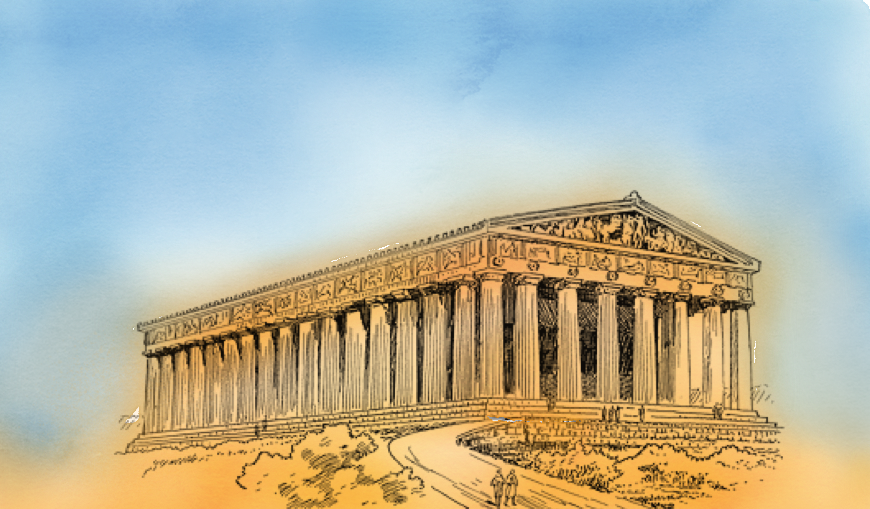The Greek Legacy

A couple of weeks ago, students at AUEB started a new semester. In this semester, I am assisting Prof. Spinellis as a TA for a course viz. SEIP (Software Engineering In Practice). A series of lab toturials were planned for the course. I took the first tutorial in this series on git and GitHub (slides can be found here). After the session, I gave the students an assignment - to contribute to a GitHub repository i.e., "The Greek Legacy". In the assignment, each student had to write about one contribution from Greeks to the world. My goals were not only to help them understand how they can use git and GitHub (since they supposed to contribute to a single file in the repository) but also to bring out the feeling of pride among them. The assignment not only achieved the above goals, but also prepared a summary of important Greek contributions to the world that many of us might not know.
You may find the (open-source) repository here; you are welcome to contribute more.
The rest of the article reproduces some of the notable Greek contributions collected and summarized during the above exercise.
Democracy
Democracy is a system of government in which the citizens exercise power directly or elect representatives from among themselves to form a governing body, such as a parliament. Democracy is sometimes referred to as "rule of the majority". The origin of the idea of democracy can be traced back to the 6th century B.C.
Olympic Games
Olympic games or Olympics is the biggest international sporting events in which athletes from around the world come together to compete in a variety of games. The ancient Olympic games were held in Olympia in the honour of Zeus. The five interlocking Olympic rings represent the continents of the world (Asia, Africa, Europe, America, and Australia).
Theatre
Theatre is a collaborative form of fine art that uses live performers, typically actors or actresses, to present the experience of a real or imagined event before a live audience in a specific place, often a stage. The performers may communicate this experience to the audience through combinations of gesture, speech, song, music, and dance. Elements of art, such as painted scenery and stagecraft such as lighting are used to enhance the physicality, presence, and immediacy of the experience.
The city-state of Athens is where western theatre originated. It was part of a broader culture of theatricality and performance in classical Greece that included festivals, religious rituals, politics, law, athletics and gymnastics, music, poetry, weddings, funerals, and symposia.
Contributions to Mathematics and Physics
The Greeks produced great advancements in mathematics which are still used today. Euclid was known for the basic rules and terms of geometry. Pythagoras is famous for his theorem A^2^ + B^2^ = C^2^ for a right-angled triangle. Pythagoras also came up with the value of pie to calculate the circumference of a circle.
Similarly, Archimedes discovered the physical law of displacement. The law of displacement is when an object moves the same volume of water as the object which is placed in it. Archimedes also used levers and pulleys to move heavy objects. He once launched a fully loaded ship all by himself. Archimedes also invented the Archimedes screw, which raises water up from rivers for the irrigation of fields. In addition to discoveries in math and physics, he also invented weapons to help the Greeks fight off Roman invasion. One of those weapons was the catapult. Unfortunately, the Romans captured his city and killed him in 21 B.C.
Ancient Greek Philosophy
Ancient Greek philosophy arose in the 6th century BC and continued throughout the Hellenistic period and the period in which Ancient Greece was part of the Roman Empire. Philosophy was used to make sense out of the world in a non-religious way. It dealt with a wide variety of subjects, including political philosophy, ethics, metaphysics, ontology, logic, biology, rhetoric, and aesthetics. Many philosophers around the world agree that Greek philosophy has influenced much of Western culture since its inception. Alfred North Whitehead once noted: "The safest general characterization of the European philosophical tradition is that it consists of a series of footnotes to Plato."
Marathon
The marathon is a long-distance running race with an official distance of 42.195 kilometres (26.219 miles, or 26 miles 385 yards). The event was instituted in commemoration of the fabled run of the Greek soldier Philippides, a messenger from the Battle of Marathon to Athens, who reported the victory over Persians in Aug/Sept 490 BC. It is said that he ran the entire distance without stopping and burst into the assembly, exclaiming νενικήκαμεν (nenikēkamen, "we have won!"), before collapsing and dying.
More than 500 marathons are held throughout the world each year, with the vast majority of competitors being recreational athletes as larger marathons can have tens of thousands of participants.
Vending Machine
The first vending machine was a construction of Heron of Alexandria (10-70 AD). He was an ancient Greek mathematician and engineer. His machine accepted a coin and then dispensed a set amount of holy water. When the coin was deposited, it fell upon a pan attached to a lever. The lever opened up a valve which let some water flow out. The pan continued to tilt with the weight of the coin until it fell off, at which point a counter-weight would snap the lever back up and turn off the valve.
Cartography
Cartography is the study and practice of making maps. It has played an important role in travel and navigation since ancient times. One of the pioneer cartographers to create the map of the world was Anaximander who made important contributions to the science of astronomy and geography.
Frappe Coffee
Frappe Coffee is an iced coffee drink with foam made by instant coffee and is usually served with milk. It was invented accidentally in 1957 in Thessaloniki,Greece by a Greek Nescafe representative and has become the most popular coffee drink for Greeks and tourists as well. The word frappe comes from French and it means to hit which is also the cause for the foam.
You may find more Greek contributions in this repository.


